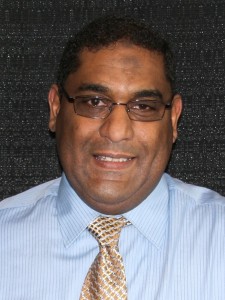Researchers Mohamed Tawhid and Sean McGuinness are sharing in the NSERC Discovery Grants for 2015, Kamloops-Thompson-Cariboo MP Cathy McLeod announced today.
Tawhid receives $90,000 for his research on metaheuristics and heuristics for global optimization problems, and McGuinness $55,000 for his work on base exchange and extremal properties of matroids.
A foundation of the government’s efforts to develop and support talented researchers at Canadian universities, the NSERC Discovery Grants Program funds discovery in chemistry, physics, life sciences, mathematics, computer science, geoscience, and the many branches of engineering.
The broad base of research capacity built by these awards has given Canada a strong reputation for research excellence around the world.
TRU President and Vice-Chancellor Alan Shaver is excited for what will come from the research.
“Thompson Rivers University is developing a vibrant and collaborative research and innovation culture with significant focus on community relevant research and knowledge translation. These grants in support of research by NSERC will spark a passion for further inquiry within dozens of students and generate new knowledge and understanding that will benefit the people and communities of the region, the nation and the world. Congratulations to our applicants.”
Said McLeod: “Our government has made record commitments to science, technology and innovation to the social and economic benefit of Canadians. Today’s investment in researchers at Thompson Rivers University will ensure that research powers Canadian business innovation to remain competitive on global markets while creating jobs at home.”
Quick Facts
On June 22, 2015, the Honourable Ed Holder, Minister of State (Science and Technology), announced that researchers across Canada will be sharing more than $340 million from NSERC’s flagship Discovery Grants program. These grants, based on recommendations from peer review committees containing world experts in each of 12 science and engineering fields, typically last five years. They provide the core funding and freedom so Canada’s best researchers can pursue their most promising ideas and breakthrough discoveries—world‑firsts in knowledge.
Researchers also will share an additional $25.2 million in Research Tools and Instruments Grants, to pay for new equipment such as mass spectrometers, high-throughput liquid chromatographs, specialized microscopes, or tracking devices for wild animals such as birds, fish or caribou.
The $77.8 million in scholarship and fellowship awards provide the flexibility and independence so Canada’s future research leaders can develop their full potential. As well, researchers with Discovery Grants use a significant part of their funding to recruit and retain talented graduate students and post-doctoral fellows from across the country and internationally.
Said NSERC President Mario Pinto: “NSERC’s Discovery Grants program is our flagship. It invests in the full range of science and engineering disciplines and thus builds the strong foundation that is a necessary prerequisite for innovation.”
The Research Support Fund provides a portion of the costs associated with managing the research funded by the Natural Sciences and Engineering Research Council, such as salaries for staff who provide administration support, training costs for workplace health and safety and maintenance of libraries.


